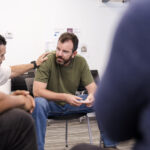Being in recovery from a drug or alcohol addiction comes with many challenges. Dealing with relapse triggers is one of them. Relapse triggers are emotional or physical cues that cause the person to want to drink or use a substance. They are a normal part of addiction recovery. Being aware that triggers will arise and having a plan to effectively cope with them is the best way to safeguard your sobriety.
Below are four common relapse triggers and ways to avoid them. Keep in mind that relapse triggers may differ from one person to another.
Stress
Stress is one of the main causes of addiction relapse. During stressful situations, people in recovery experience a stronger desire for their substance of choice, especially if they took drugs or alcohol as a coping mechanism before becoming sober.
Although it is impossible for a person to eliminate all of the stress in their life, it is possible to avoid people and situations that cause feelings of excessive stress. Think about the stress you are experiencing. Write a list of all of the places, people, or things causing you extreme stress. For example, are you in a toxic relationship, unhappy at work, or having a financial situation? Once you identify the cause of your excessive stress, you need to make any changes in your relationships, priorities, or lifestyle that will reduce the stress you are feeling.
It is also critical to learn healthy ways to reduce and manage stress successfully, including:
- Taking good care of yourself by getting enough sleep and eating a healthy diet
- Practicing mindfulness
- Exercising regularly
- Practicing deep breathing, relaxation techniques, or meditation
- Learning to effectively manage your time
Negative or Challenging Emotions
Negative or challenging emotions are often experienced along with stress. Many people in recovery took drugs or drank alcohol to find temporary relief from their negative emotions, such as anger, depression, or anxiety. Being sober means finding healthy ways of managing your feelings. Think of challenging emotions as a chance for understanding and growth instead of a setback in recovery. Ask yourself what you are feeling and why. Just acknowledging what you’re feeling without judging it will help you get more comfortable with your emotions.
When you feel negative, find a healthy way to process it. Express your feelings by writing in your journal, painting a picture, meditating, or praying. Do something you enjoy, such as going for a walk, exercising, reading a book, or relaxing in a warm bath.
People, Places, and Situations Connected to Your Addictive Behavior
For many people in recovery, relapse triggers are connected to people, places, or things that remind them of drinking alcohol or using drugs. Friends that were your drinking or drugging buddies may be a trigger even if they are not drinking or using. A restaurant where you used to go after work to drink may be a trigger. Passing your favorite bar on your drive home from work can be a trigger.
Avoiding being around substances, especially alcohol, is not always easy, so have a plan in place for times when unavoidable triggers arise. For example, take a different route home from work to avoid passing your favorite bar. Know what you will do if you find yourself in a triggering situation. Will you call a sober friend? Will you make an excuse to leave early? Be prepared.
Being Overconfident in Recovery
Addiction recovery is an ongoing, lifelong journey. Feeling like you are cured and no longer need to worry about triggers is a relapse trigger in itself. It’s understandable to want to put addiction behind you once and for all. But this can lead to a decision to stop doing things that support sobriety: going to 12-Step meetings, seeing a therapist, practicing self-care, etc. Remember that relapse can occur at any stage of recovery. It can happen whether you have 15 weeks, 15 months, or 15 years of sobriety.
It is essential to have a strong sense of self-confidence in recovery. However, it is necessary to not cross the line into complacency and overconfidence. You may put yourself in a risky situation and feel you are strong enough to stop after having just one drink or using a drug one time.
Are You Struggling with Drugs or Alcohol?
Drug and alcohol addiction can affect anyone. If you or someone you care about is struggling with addiction, it is time to get the help you need. At English Mountain Recovery in the Smoky Mountains of Tennessee, skilled professionals will guide you through your recovery. Now is the right time to take the first step. Call us today.



